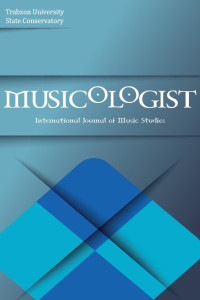Abstract
References
- Bithell, Caroline. (2000). “Corsican Sound: Individuality, Evolution, and Transformation”. Problems of Folk Polyphony. (Materials of the International Conference dedicated to the 80th anniversary of the V. Sarajishvili Tbilisi State Conservatoire). Gabunia N., Tsurtsumia R., Chokhonelidze K. (Eds). (pp. 42-48). Tbilisi: V. Sarajishvili Tbilisi State Conservatoire.
- Сhokhonelidze, Evsevi. (1995-1996). “Georgian Folk Music and Contemporaneity (Issues of History and Theory).” Annual scientific work, Manuscript. Tbilisi State Conservatoire.
- Gabisonia, Tamaz. (2014). “Criteria for the “Authenticity” in Georgian Folk Music Performance”. Musicology. 17: 21-43.
- Gabisonia, Tamaz. (2015). “Author in Georgian Ethnic Music”. Problems of Performing Folk and Church Music: 145-162.
- Kiknadze, Zurab. (2008). Georgian Folklore. Tbilisi: Tbilisi University Publishing
- Kotetishvili, Vakhushti. (2007). White Flower on the Rock. Tbilisi: Merani
- Nikoladze, Anna, (04.12.2014). jgufi bani xevsuruli simgera axali. (video file). Retrieved from https://www.youtube.com/watch?v=5elwySJhgQ4
- Trio Mandili. (08.04.2020). Trio Mandili - Acharuli (Quarantine style) (video file). Retrieved from https://www.youtube.com/watch?v=wBgYaktc69o
- Kenchiashvili Official. (23.12.2016) Dato Kenchiashvili – isev da isev. (video file). Retrieved from https://www.youtube.com/watch?v=jZCbXTtFlEM
- Lomsadze, Teona. (2021). “Modern Functioning Forms of Georgian Folk Music (on the example of Folk Fusion)”. Abstract of the PhD dissertation, Tbilisi State Conservatoire, Tbilisi: Georgia.
- Nettl, Bruno. (2015). The Study of Ethnomusicology, Thirty Three Discussions. Urbana, Chicago and Springfield: University of Illinois Press.
- Nettl Bruno (2022). Folk Music. Retrieved from https://www.britannica.com/art/folk-music
- Razmadze, Malkhaz. (2016-2017). “On Modernized Folklore" (general overview of the phenomena accompanying Georgian authentic folk music)”. Proceedings of the Institute of History and Ethnology, XIV-XV: 608-616.
- Trio Mandili. (n.d.). About us Retrieved from http://triomandili.com/
- Zemtsovsky, Izali. (1977). “Folk Music and Contemporaneity (On the Issue of Folklore Definition)”. Contemporaneity and Folklore (Articles and Materials) 28-75. Moscow: Music
- Zemtsovsky, Izali. (2004). “The Life of Folklore Traditions: Exaggerations and Paradoxes”. The Transmission Mechanism of Folklore Tradition: (Materials of the 21st International Youth Conference in memory of A. Gorkovenk). Ed. N. Abubakirova-Glazunova, (pp. 5-25). St. Petersbourg: Russian Instiute of History Arts.
Abstract
In today’s Georgia most of the songs by contemporary authors referred to as ‘folk’ have little to do with traditional musical regularities; the examples, disseminated as specific, established variants, are also called ’folk’. Modernized instruments created in the 20th century are also regarded as folk. It is strange that their consideration as folk examples is often acceptable to their authors. The article aims to study contemporary author’s songs and to reveal their connection with the regularities of folk musical language.
In the modern era author’s songs on folk motives have not yet been given scientific name. Georgian researchers refer to such examples as ‘para-folklore’, ‘modernized folklore’ and ‘pop-folk’. In all three definitions they are called folklore. The difference between them is shown only by the prefix.
This article poses specific problems and shows possible solutions to them, for example: what brings the contemporary author’s songs closer to folk tradition? Why are they considered folk? What are their characteristic musical features? What factor contributes to the popularity of these examples? Also, based on the musical analysis and personal interviews, the folk character of the repertoire of contemporary author’s song performers (trio Mandili, Gogochuri sisters, group Bani, Davit Kenchiashvili) is discussed.
Keywords
References
- Bithell, Caroline. (2000). “Corsican Sound: Individuality, Evolution, and Transformation”. Problems of Folk Polyphony. (Materials of the International Conference dedicated to the 80th anniversary of the V. Sarajishvili Tbilisi State Conservatoire). Gabunia N., Tsurtsumia R., Chokhonelidze K. (Eds). (pp. 42-48). Tbilisi: V. Sarajishvili Tbilisi State Conservatoire.
- Сhokhonelidze, Evsevi. (1995-1996). “Georgian Folk Music and Contemporaneity (Issues of History and Theory).” Annual scientific work, Manuscript. Tbilisi State Conservatoire.
- Gabisonia, Tamaz. (2014). “Criteria for the “Authenticity” in Georgian Folk Music Performance”. Musicology. 17: 21-43.
- Gabisonia, Tamaz. (2015). “Author in Georgian Ethnic Music”. Problems of Performing Folk and Church Music: 145-162.
- Kiknadze, Zurab. (2008). Georgian Folklore. Tbilisi: Tbilisi University Publishing
- Kotetishvili, Vakhushti. (2007). White Flower on the Rock. Tbilisi: Merani
- Nikoladze, Anna, (04.12.2014). jgufi bani xevsuruli simgera axali. (video file). Retrieved from https://www.youtube.com/watch?v=5elwySJhgQ4
- Trio Mandili. (08.04.2020). Trio Mandili - Acharuli (Quarantine style) (video file). Retrieved from https://www.youtube.com/watch?v=wBgYaktc69o
- Kenchiashvili Official. (23.12.2016) Dato Kenchiashvili – isev da isev. (video file). Retrieved from https://www.youtube.com/watch?v=jZCbXTtFlEM
- Lomsadze, Teona. (2021). “Modern Functioning Forms of Georgian Folk Music (on the example of Folk Fusion)”. Abstract of the PhD dissertation, Tbilisi State Conservatoire, Tbilisi: Georgia.
- Nettl, Bruno. (2015). The Study of Ethnomusicology, Thirty Three Discussions. Urbana, Chicago and Springfield: University of Illinois Press.
- Nettl Bruno (2022). Folk Music. Retrieved from https://www.britannica.com/art/folk-music
- Razmadze, Malkhaz. (2016-2017). “On Modernized Folklore" (general overview of the phenomena accompanying Georgian authentic folk music)”. Proceedings of the Institute of History and Ethnology, XIV-XV: 608-616.
- Trio Mandili. (n.d.). About us Retrieved from http://triomandili.com/
- Zemtsovsky, Izali. (1977). “Folk Music and Contemporaneity (On the Issue of Folklore Definition)”. Contemporaneity and Folklore (Articles and Materials) 28-75. Moscow: Music
- Zemtsovsky, Izali. (2004). “The Life of Folklore Traditions: Exaggerations and Paradoxes”. The Transmission Mechanism of Folklore Tradition: (Materials of the 21st International Youth Conference in memory of A. Gorkovenk). Ed. N. Abubakirova-Glazunova, (pp. 5-25). St. Petersbourg: Russian Instiute of History Arts.
Details
| Primary Language | English |
|---|---|
| Subjects | Music |
| Journal Section | Articles |
| Authors | |
| Publication Date | December 31, 2022 |
| Published in Issue | Year 2022 Volume: 6 Issue: 2 |


